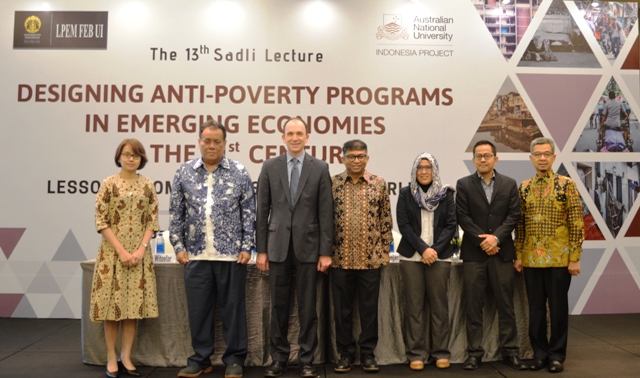
Left to right: Arie Damayanti (moderator), Ari Kuncoro (Dean of FEB UI), Ben Olken (13th Sadli Lecture speaker), M. Ikhsan (Vice President’s Office), Riatu Qibthiyyah (LPEM FEB UI), Firman Witoelar (ANU Indonesia Project) and Denny Admiral (relative of the late Professor Sadli)
The 13th Sadli Lecture is an annual event that is hosted by Institute for Economics and Social Research, Faculty of Economis and Business Universitas Indonesia (LPEM FEB UI) in collaboration with ANU Indonesia Project. The event was held at Pullman Hotel Thamrin, Jakarta on Tuesday, 20 August 2019. The event commenced with opening remarks by Professor Ari Kuncoro (FEB UI) and a keynote remarks by Professor Mohamad Ikhsan (FEB UI and Vice President’s Office). The session proceeds with a presentation by Professor Ben Olken (Department of Economics, Massachusetts Institute of Technology) and discussions by Riatu Mariatul Qibthiyyah (FEB UI) and Firman Witoelar (ANU Indonesia Project).
In his keynote speech, Professor Ikhsan talked about the role of SUSENAS and IFLS in enriching studies on poverty in Indonesia. Regarding poverty alleviation, he noted that Indonesia is now facing the last-mile problem, in which the problem of poverty becomes more heterogeneous. As a result, solving poverty requires a higher level of targeting. In line with the objective of The Sadli Lecture, Professor Ikhsan asserted the important role of the academia in providing facts to the public and the government to inform better policy making and create healthy public discussions.
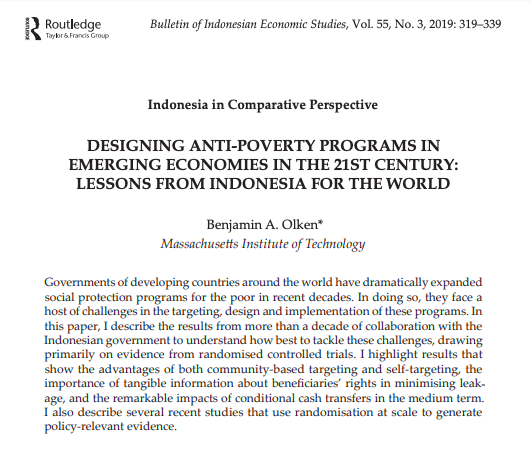 Bulletin of Indonesian Economic Studies, Vol. 55, No. 3, 2019
Bulletin of Indonesian Economic Studies, Vol. 55, No. 3, 2019
Next, Professor Ben Olken gave insights on a paper that is published in the Bulletin of Indonesian Economic Studies (BIES). In the past, the majority of the world’s extreme poor are located in lower income countries. Now, they are mostly located in middle income countries like Indonesia. This means that the strategies to alleviate poverty should be different from those used 30 years ago. There has also been a shift away from overall price subsidies (food, energy) to targeted transfers because the former is less targeted, thus helping the rich as much as the poor and causes fiscal strain. In Indonesia, there has been a number of targeted transfers, such as Rastra, BLT, PKH, BSM, and BLSM. However, they are not without challenges. Some main questions arise in the assessment of these programs: Who is eligible to receive assistance and how do we identify them? What type of assistance do we provide? How do we make sure assistance actually reaches eligible families? And what is the impact of assistance on poverty and well-being?
To answer those questions, Professor Olken, along with The Abdul Latif Jameel Poverty Action Lab (J-PAL) have conducted numerous randomized impact evaluations in Indonesia to see the causal impacts of a program. These programs are conducted by randomly dividing participants into statistically equivalent treatment and control groups. After the intervention, the outcomes in each group are measured and compared. If an intervention is found effective, it can be scaled up to a bigger population. As an example, the nation-wide scaling up of Raskin cards was informed by a previous randomized impact evaluation. With these collaborations with the government, Indonesia has led the world in generating evidence that can support and improve the design of social programs.
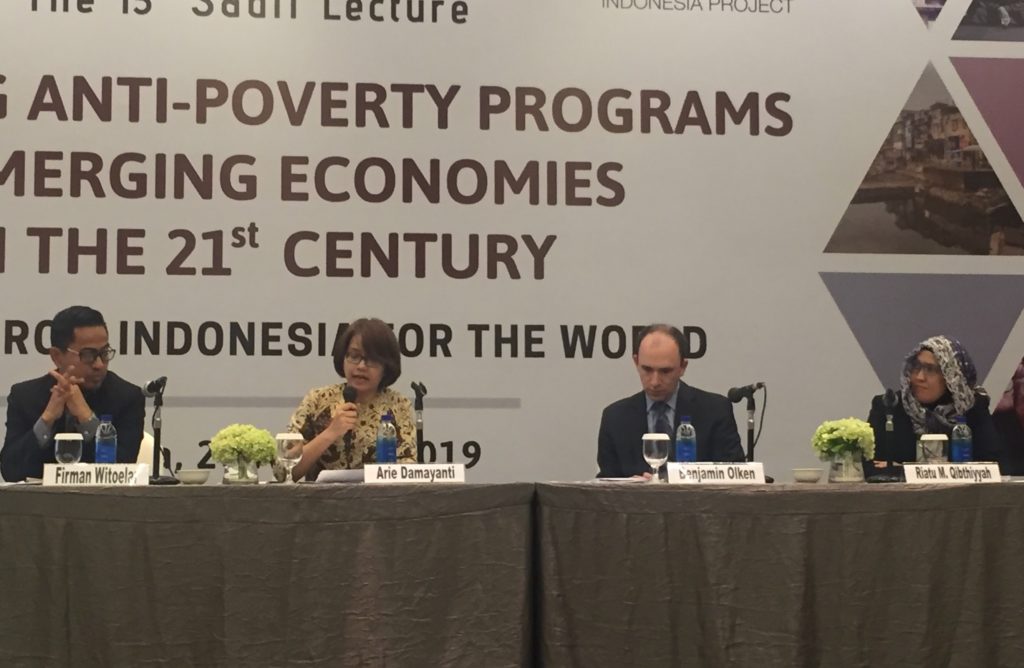 The first discussant, Riatu Mariatul Qibthiyyah applauded the paper for providing evidence of what works and what does not for the Government of Indonesia. She also pointed out several challenges in terms of consistency from research to policy adoption, scaling-up to a national level, and improving data from regular surveys.
The first discussant, Riatu Mariatul Qibthiyyah applauded the paper for providing evidence of what works and what does not for the Government of Indonesia. She also pointed out several challenges in terms of consistency from research to policy adoption, scaling-up to a national level, and improving data from regular surveys.
Lastly, Firman Witoelar discussed further lessons that can be taken from the paper. Regarding the targeting of anti-poverty programs, Firman brought up some challenges in scaling up a policy, which include the need for a certain level of supply-side readiness. Firman also raised a concern on the allocation of resources between protection programs and poverty alleviation programs. Finally, he concluded with several lessons on creating long-term collaborations between government and research agencies.
For the complete presentation and Q&A session, please refer to the video and materials provided. Photos from the event can be accessed from this link.
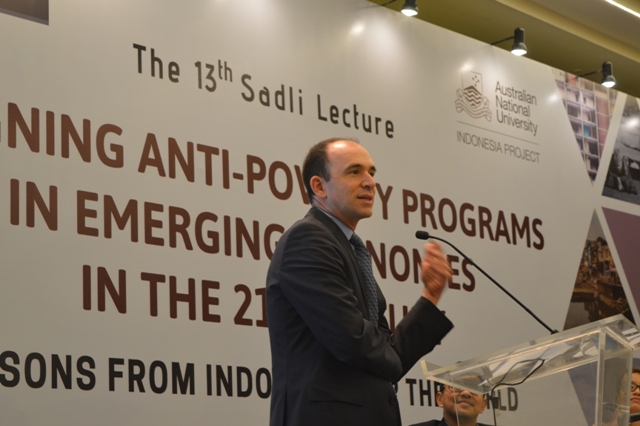
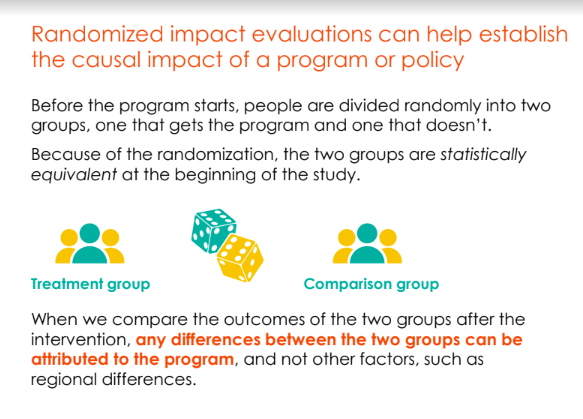
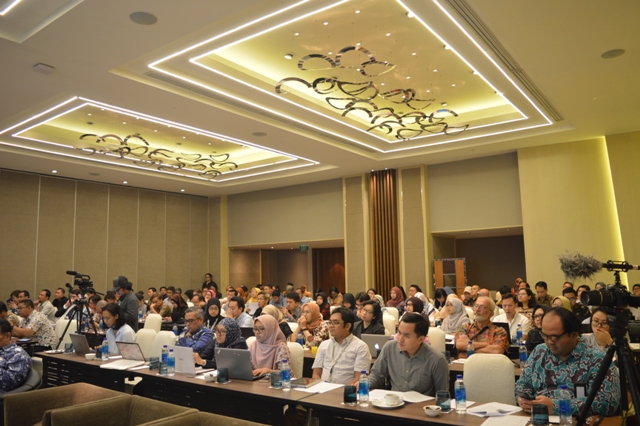
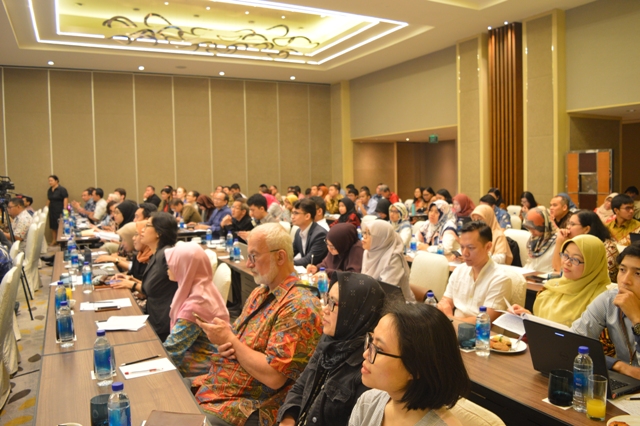
![[FKP hosted by ANU Indonesia Project] COVID-19, food insecurity, and cash transfer in Cambodia](https://www.fkpindonesia.org/wp-content/uploads/2024/02/fkp-2024-03-21-thumbnail-500x383.jpg)
![[FKP hosted by ANU Indonesia Project] Is it a curse or blessing to have a resource-rich neighbour?](https://www.fkpindonesia.org/wp-content/uploads/2024/02/fkp-2024-03-13-thumbnail-500x383.jpg)
![[FKP hosted by Universitas Padjadjaran] Kesehatan ibu pasca melahirkan di Indonesia](https://www.fkpindonesia.org/wp-content/uploads/2024/02/fkp-2024-02-21-thumbnail-500x383.jpg)
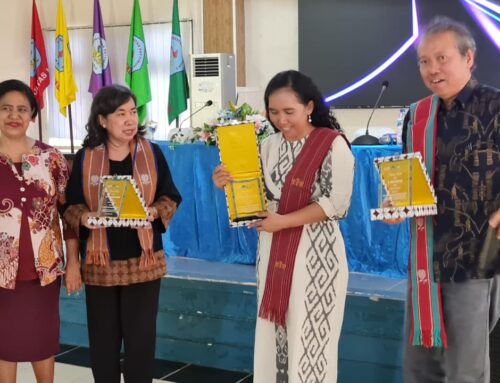
![[FKP hosted by ANU Indonesia Project] The pursuit of food self-sufficiency in Indonesia: food-trade policy preferences during the administrations of Yudhoyono (2004-2014) and Widodo (2014-present)](https://www.fkpindonesia.org/wp-content/uploads/2024/01/fkp-2024-01-16-500x383.jpg)